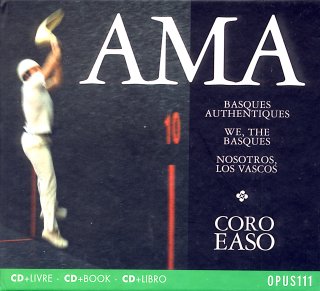Ama - We, the Basques
 Coro Easo directed by Xalba
Rallo Sagarazu
Coro Easo directed by Xalba
Rallo Sagarazu
 96 page hardback book and
CD
96 page hardback book and
CD
ISBN 2-913542-06-9 / OPUS III OPS 30-271 [62:53]
Crotchet
Amazon
UK Amazon USA

Like Opus III's Naples: City of Celebrations from the 14th
to the 19th, this is another hybrid book/CD release, though
this time a single disc packaged inside the back cover of a hardback marginally
larger than a conventional CD jewel-case. The book is a copiously illustrated
account of the Basque people, divided into four chapters on History, Today,
Culture & Music, together with the texts of the 19 songs and a useful
outline of the development of the Easo Choir. As with the previous book,
the text is multilingual, this time in English, French and Spanish, helpfully
colour-coded so that English-speakers can happily avoid anything that isn't
printed in green - except the back cover, where the English is in red and
the Spanish green. This is a beautifully produced package, infinitely better
than the standard flimsily booklet in plastic box, and gives the encouraging
impression that someone really cares about the release.
There are 19 songs written by mainly 20th century composers. The
earliest was born in 1828 (J.B. Elizamburu), the latest in 1935 (T.
Aragüés Bernad). I would imagine that the names of the song-writers
will be without exception unfamiliar to virtually all the readers of Classical
Music on the Web, so suffice to say that collectively this album documents
a body of work in the folk tradition, with songs that either address the
universal themes of love, sorrow, nature and the vagaries of existence, or
alternatively paint little scenes from daily life.
Formed in San Sebastian in 1937, by men returning from the Spanish Civil
War, who due to their politics were unable to join the existing choirs, the
Easo Choir has developed over the years into something much more extensive.
Originally a choir of bass voices, the intention has been to maintain and
develop the Basque tradition of choir music and a cappella singing. More
recently the choir started recruiting children from the schools of San Sebastian,
establishing the Easo Txiki (Small Easo), a religious choir. In 1995 a Gregorian
chapel choir was added, and now there is also a juvenile choir and a chamber
music choir. Thus musical director Xalba Rallo Sagarazu actually has five
choirs dedicated to various aspects of music under his control. However,
on this disc we hear the original male choir, long since expanded to include
the full range of voices from bass to tenor.
The programme is clearly designed as a showcase, offering songs of great
diversity. A thread of melancholy seems to run through both music and words,
a clear pastoral poetic spirit greatly in evidence. There are parallels with
Welsh choral singing, and moments which recall Vaughan-Williams hymn settings,
yet of course this is a very different choral world to that of English song.
A mournful tenor voice laments against a soft choral backdrop on 'Eagles
Over the Mountains', a warning against "perfidious love", while 'My Home'
is a tribute to the joys of "a little white house", a lullaby melody which
leads to the title song. Ama means 'mother', a song of homesickness and longing
to return. Against these a group of 'Basque Songs' offer tributes to a bird
in an apple tree and a cuckoo in an oak, while 'The Old Ladies' is a jovial
a cappella number about spinsters seeking a husband.
It may be that unfamiliarity results in a certain distance, and I found this
programme easier to appreciate than to wholeheartedly enjoy. The singing
is unquestionably excellent, as is the recorded sound, which produces a natural,
warm sound-stage in a rather reverberate acoustic. Lovers of choral music
and folk music may find this a most welcome change from more familiar material,
and there is no doubt that the programme serves it's purpose of introducing
both Basque song and something of the culture in an elegantly presented and
most accessible way.
Reviewer
Gary S. Dalkin

